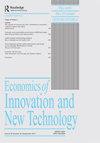数字金融的发展能否激发企业创新?来自中国的经验证据
IF 2.6
3区 经济学
Q1 ECONOMICS
引用次数: 1
摘要
摘要本文基于中国a股上市企业数据,运用面板数据模型和基于回归的中介分析,考察了数字金融发展对企业不同创新行为的实际影响及其机制。研究发现,数字金融的发展不仅促进了企业的研发投入,而且提高了企业创新产出的数量和质量。数字金融对企业研发投入的激励作用强于对创新产出的激励作用,数字金融对企业突破性创新的激励作用强于增量式创新的激励作用。数字金融的“拓宽”和“深化”对企业创新都有显著的正向影响,而数字金融的“数字化程度”对企业创新没有显著影响,甚至可能阻碍创新质量的提高。数字金融对国有企业创新产出的激励作用表现为“量”,对非国有企业创新产出的激励作用表现为“质”。数字金融可以通过缓解企业融资约束、优化政府补贴制度、改善营商环境等方式激发企业创新。关键词:数字金融企业创新创新质量商业环境政府补贴披露声明作者未发现潜在利益冲突基金资助:山东省自然科学基金[资助号:ZR2023MG075];国家哲学社会科学规划办公室[批准号20FJYB017]。本文章由计算机程序翻译,如有差异,请以英文原文为准。
Can the development of digital finance stimulate enterprise innovation? Empirical evidence from China
ABSTRACTBased on the data of China A-share listed enterprises, this paper examines the actual effect and mechanism of the development of digital finance on different innovation behaviors of enterprises, by using the panel data model and regression-based mediation analysis. It is found that the development of digital finance not only promotes the R&D investment of enterprises but also improves the quantity and quality of enterprise innovation output. The incentive effect of digital finance on enterprise R&D investment is stronger than that on innovation output, while the incentive effect of digital finance on enterprise breakthrough innovation is stronger than that of incremental innovation. Both the ‘broadening’ and the ‘deepening’ of digital finance have a significant positive effect on enterprise innovation, while the ‘digitalization degree’ of digital finance has no significant effect on enterprise innovation, and even may hinder the improvement of innovation quality. The incentive effect of digital finance on the innovation output of state-owned enterprises is reflected in ‘quantity’, while the incentive effect on innovation of non-state-owned enterprises is reflected in ‘quality’. Digital finance can stimulate enterprise innovation by easing the financing constraints of enterprises, optimizing the government subsidy system, and improving the business environment.KEYWORDS: Digital financeenterprise innovationinnovation qualitybusiness environmentgovernment subsidies Disclosure statementNo potential conflict of interest was reported by the author(s).Additional informationFundingThis work was supported by Shandong Provincial Natural Science Foundation [Grant Number ZR2023MG075]; National Planning Office of Philosophy and Social Sciences of China [Grant Number 20FJYB017].
求助全文
通过发布文献求助,成功后即可免费获取论文全文。
去求助
来源期刊

Economics of Innovation and New Technology
ECONOMICS-
CiteScore
7.20
自引率
3.00%
发文量
30
期刊介绍:
Economics of Innovation and New Technology is devoted to the theoretical and empirical analysis of the determinants and effects of innovation, new technology and technological knowledge. The journal aims to provide a bridge between different strands of literature and different contributions of economic theory and empirical economics. This bridge is built in two ways. First, by encouraging empirical research (including case studies, econometric work and historical research), evaluating existing economic theory, and suggesting appropriate directions for future effort in theoretical work. Second, by exploring ways of applying and testing existing areas of theory to the economics of innovation and new technology, and ways of using theoretical insights to inform data collection and other empirical research. The journal welcomes contributions across a wide range of issues concerned with innovation, including: the generation of new technological knowledge, innovation in product markets, process innovation, patenting, adoption, diffusion, innovation and technology policy, international competitiveness, standardization and network externalities, innovation and growth, technology transfer, innovation and market structure, innovation and the environment, and across a broad range of economic activity not just in ‘high technology’ areas. The journal is open to a variety of methodological approaches ranging from case studies to econometric exercises with sound theoretical modelling, empirical evidence both longitudinal and cross-sectional about technologies, regions, firms, industries and countries.
 求助内容:
求助内容: 应助结果提醒方式:
应助结果提醒方式:


